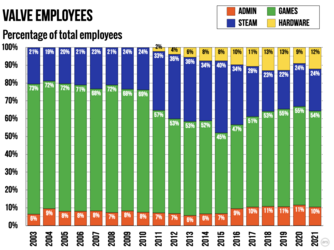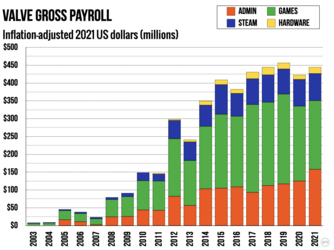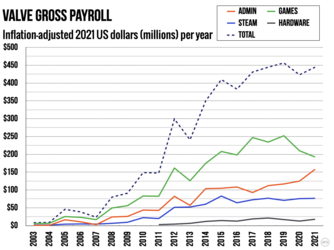Valve runs its massive PC gaming ecosystem with only about 350 employees
Ars' leak analysis shows a large "Games" department and a very well-paid "Admin" team.
KYLE ORLAND - 7/17/2024
As a private and generally secretive company, Valve doesn't offer much outside visibility into its inner workings. So when years' worth of data on the company's employee and aggregate payroll numbers leaked recently, we were eager to take a deep dive to see what those numbers could tell us about the operation and evolution of a company that
has a hand in the majority of PC gaming transactions.
The recent data comes from a poorly redacted document in
Wolfire's antitrust lawsuit against Steam, as
first noticed over the weekend by SteamDB's Pavel Djundik. While the key data in the document has now been properly hidden in the court docket,
The Verge captured the raw numbers from a table labeled "Employee Headcount and Gross Pay Data, 2003-2021."
Breaking down that data by year and department with some simple graphs and statistics, seen below, gives us outsiders a rare partial glimpse into Valve's organization. All told, it's a bit hard to believe that this lynchpin of the PC gaming world has rested on the work of just a few hundred people for many years now.
Small but mighty
 Valve's total employee count has been remarkably stable for years.
Valve's total employee count has been remarkably stable for years.
 The majority of Valve's headcount has remained in the Games department, even as Valve releases few games these days
The majority of Valve's headcount has remained in the Games department, even as Valve releases few games these days
It's striking to consider just how small Valve is compared to other major players in the game industry. In 2021, Microsoft
estimated Valve's annual revenue at $6.5 billion, roughly on the same scale as
EA's $7.5 billion in 2024 revenue. But Steam achieved those numbers with around 350 employees, compared to
well over 13,000 people employed by EA.
The disparity highlights just how much money Valve brings in with a relatively small workforce. And a lot of that is thanks to the chunk of revenue Valve takes from every sale on Steam. The dominant PC gaming marketplace has seen
a massive increase in the number of annual game releases since 2012 or so, thanks to initiatives like
Steam Greenlight and
Steam Direct.
Yet, surprisingly, the size of the "Steam" department inside Valve has shrunk in recent years, from a peak of 142 employees in 2015 down to just 79 in 2021. From the outside, having just 79 employees keeping track of
more than 11,000 Steam releases in 2021 is a pretty incredible ratio.
Some readers may also be surprised that Valve's "Games" department has represented a majority of the company's headcount since 2003. That has remained true (though to a lesser extent) even in more recent years, as Valve's output of new games
has become much more occasional. It seems likely a large number of those Games department employees are devoted to ultra-popular Valve games like
Dota 2 and
Counter-Strike 2, which enjoy tens of millions of players and need significant support work.
 Valve only had a few dozen Hardware department employees in the run up to the launch of the Steam Deck.
Valve only had a few dozen Hardware department employees in the run up to the launch of the Steam Deck.
The leaked data also shows the slow rise of Valve's small Hardware department, which started with just three employees in 2011 as the company
began work on its
doomed Steam Machines initiative. Transitioning into
the Valve Index era in the late 2010s, the hardware department still represented just a few dozen people and a paltry 3 to 4 percent of the company's annual payroll.
By the time we hit 2021 and
the run-up to the Steam Deck, the Hardware division still makes up just 12 percent of Valve's small total headcount. Looking back, it's impressive that such a small team was able to create a portable gaming device that
quickly spawned a
whole micro-industry of
imitators. We can only hope the Hardware team got a little more employee support in the wake of the Steam Deck's market success.
"We are relatively recently a hardware company," Valve's Greg Coomer
told Rock Paper Shotgun in 2021. "And our DNA is really in software where upgrading stuff, it takes as long as writing some code and shipping it on the internet. So the people who work here, you know, we've hired a ton of experts in the hardware field who have all been slowly teaching us, 'You can't really operate the same way in hardware and just upgrade things whenever you feel like it.'"
Some are more equal than others
 Valve's aggregate gross payroll kept increasing even after employee headcount stopped growing in 2012.
Valve's aggregate gross payroll kept increasing even after employee headcount stopped growing in 2012.
 Total employee spending in the Hardware department is heavily outclassed by other departments at Valve.
Total employee spending in the Hardware department is heavily outclassed by other departments at Valve.
 A logarithmic scale to better highlight small differences in the early years of the chart.
A logarithmic scale to better highlight small differences in the early years of the chart.
 The Games department continues to make up the lion's share of employee gross pay.
The Games department continues to make up the lion's share of employee gross pay.
Looking past the departmental breakdowns, we can easily pick out a few distinct eras in Valve's recent employment history. The first is one of pretty consistent growth: With just 78 employees in 2003, Valve's total headcount increased steadily until it hit 351 employees in 2012. This period coincided with Steam becoming the primary method for PC gamers to access new titles, and it included the relatively quick death of boxed retail PC game sales.
After 2012, Valve's total employee count remained remarkably steady, hovering between 325 and 375 employees through 2021. But total spending on gross pay for all employees continued rising even as total headcount remained steady, growing from about $300 million (inflation-adjusted 2021 dollars) in 2011 to just under $450 million in 2021.
Thus, the mean gross pay per employee throughout Valve shot up from about $483,000 in 2011 to $1.32 million per employee in 2021. That might sound high, but it seems downright conservative for a company bringing in roughly the same revenue as a major game publisher with about 38 times as many employees.
Yet these overall pay averages obscure massive discrepancies in mean gross pay by department. The handful of Hardware employees had by far the smallest average pay of the four listed departments at nearly $500,000 per year in 2021. However, the 35 members of the Admin department are well on the other end of the pay distribution, averaging $4.5 million in gross pay per employee in 2021.
 The Admin department is the best paid at Valve by far, on a per-person basis. But that wasn't always the case.
The Admin department is the best paid at Valve by far, on a per-person basis. But that wasn't always the case.
 Admin employees at Valve bring in a mean of nearly $4.5 million per year in salary.
Admin employees at Valve bring in a mean of nearly $4.5 million per year in salary.
 Logarithmic scale to make small differences more visible.
Logarithmic scale to make small differences more visible.
It wasn't always this way at Valve. Back in 2004, the mean Admin employee's pay was only 95 percent of the mean non-Admin employee. That could be seen as a testament to the company's much-publicized "flat" organizational structure, summarized in
the Valve New Employee Handbook as one where "we don’t have any management, and nobody 'reports to' anybody else. We do have a founder/president, but even he isn't your manager."
But if members of the Admin department don't act as "managers," in aggregate, they're certainly paid like they are. Since 2005, the Admin department's mean pay ratio has generally hovered anywhere from 250 to 550 percent of mean non-Admin pay, settling in at a 474 percent ratio in 2021. All told, in 2021, the Admin department represented just 10 percent of Valve's total employees but 36 percent of its total gross payroll.
It's hard to draw out too much detail from these mean numbers, of course. For all we know, lofty eight- or nine-figure salaries for just a handful of executives could be skewing the mean pay for the 35-employee Admin department. And the pay disparities shown here seem downright quaint when CEO Bobby Kotick was
making 1,560 times as much money as the median Activision employee in 2020. Still, the existence of this well-paid "Admin" class at Valve at least raises questions about the company's vaunted lack of hierarchy.
Overall, this small glimpse into Valve's structure only gives a somewhat skewed, partial, and somewhat outdated picture of the employee structures that help the world's largest PC gaming platform run. But even this small glimpse is likely to be the most visibility we get into this private company for the foreseeable future.











